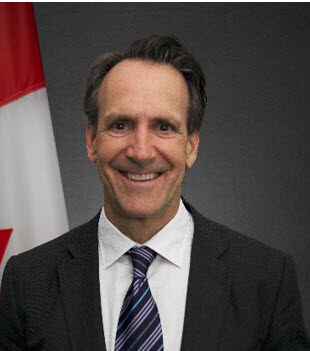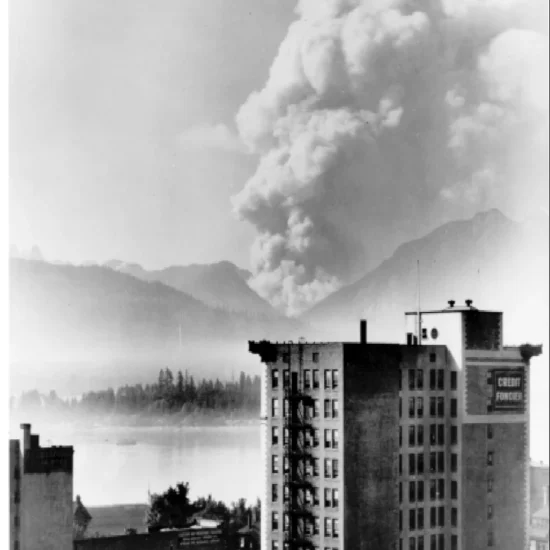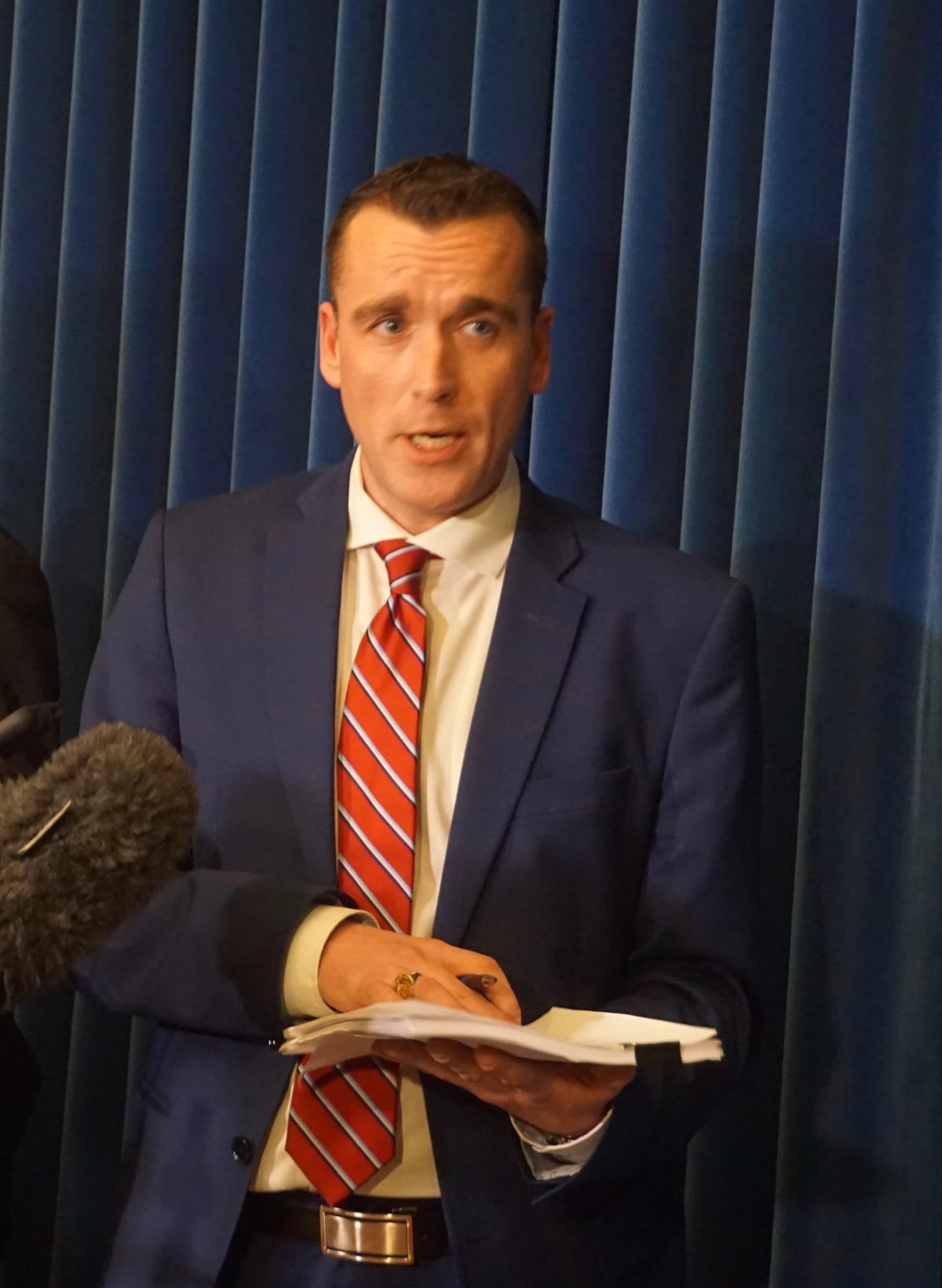
Bob Mackin
The first police force in British Columbia that could be disbanded in the pandemic era is the one at the Parliament Buildings.
The $13,000 review of security at the British Columbia Legislative Assembly that bothered the opposition BC Liberals last summer recommends saving $1 million by transforming the Legislative Assembly Protective Services (LAPS) into a security department.

Alan Mullen, special advisor to Speaker Darryl Plecas, with the damning report on the suspended officials (Mackin)
Alan Mullen, chief of staff to Speaker Darryl Plecas, took a fact-finding road trip to nine other legislatures in North America and came back to write a 55-page report to the Legislative Assembly Management Committee (LAMC) called “Review of the Sergeant-at-Arms Department and Proposals for Reform.”
Mullen submitted the report in January — 51 weeks after Plecas’s bombshell report about corruption in the offices of the clerk and sergeant-at-arms. It was presented to LAMC at a closed-door meeting, but has yet to be made public. The all-party committee most-recently met on June 16.
Mullen’s report was ahead of its time. Protests against police brutality that erupted last month after the murder of George Floyd in Minneapolis have led to a campaign to defund police forces. In B.C., solicitor general and NDP house leader Mike Farnworth has pledged to review and reform the 45-year-old Police Act.
theBreaker.news has seen a copy of Mullen’s review and it recommends the position of sergeant-at-arms be downgraded to a ceremonial role, with security and facilities maintenance overseen by others. Mullen also recommends the LAPS become a security department.
“Legislative Assembly Protective Services officers are generally overqualified for the vast majority of the work they do,” Mullen wrote. “That department has grown according to a ‘police force’ model, which is not necessary when compared to operational requirements.”
LAPS has 38 uniformed special constables, who are armed with pistols, 26 sessional officers and seven unarmed civilian screeners. The force with jurisdiction over just 5.9 hectares near Victoria’s Inner Harbour cost $5 million of the $5.7 million sergeant-at-arms budget in 2018-2019. Last year, the Sergeant-at-Arms office cost $6.13 million.
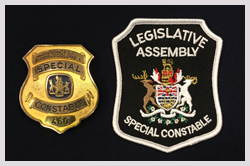
Legislative Assembly Protective Services badges (Leg.BC.ca)
By comparison, Oak Bay taxpayers spent $4.7 million for 23 officers to police the community of 19,228 in 2018. Central Saanich had a slightly smaller population, but its 23-member force cost just over $5 million that year.
LAPS officers work rotating 12-hour shifts, on a four days on, four days off regime, but collectively pocket hundreds of thousands of dollars in overtime wages annually. Since 2014, total LAPS overtime costs have exceeded $1.8 million. In 2018-19, total salaries and benefits cost $4.66 million.
“In addition to the financial consequences of high staff overtime, there is of course a human consequence: regular overtime by definition represents a greater burden on employees than their role is designed to entail,” Mullen wrote. “Where that becomes the norm, it may lead to higher risk of burnout or other adverse consequences for the individual. Particularly in security roles, it is important to ensure staff are having adequate time off.”
The report said not all staff need to be armed, or even need to be special provincial constables. Policing could be handled by external partner agencies, while security handled in-house. Overtime pay could be reduced by staffing according to need, “as appropriate for when the House is or is not in session, as well as for day and night shifts.”
The result, the report said, would save British Columbia taxpayers $1 million a year without compromising security.
Mullen also recommended that an external consultant should be hired to help the transition to an optimal, as opposed to constant, staffing model.
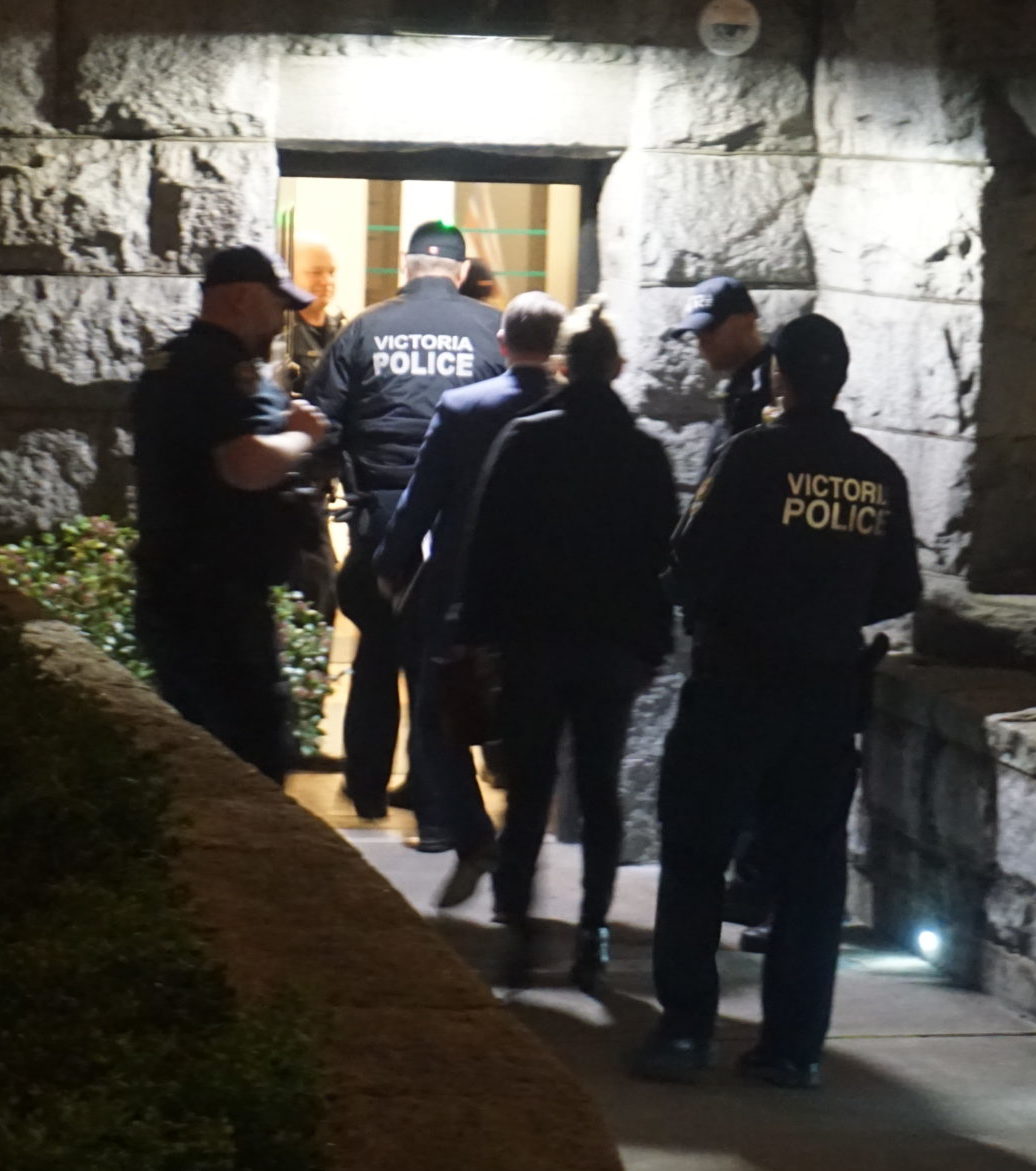
Police enter the Parliament Buildings on March 5 (Mackin)
The vast majority of incidents requiring LAPS to respond did not require specialized training. In 2018, the report said, there were 72 Criminal Code incidents, but 2,140 general occurrence incidents, including protests and demonstrations (135), consumption of drugs or liquor (129) and urinating in public (9).
A majority of LAPS members are 55 or older and 31 of 38 members are male. The civilian staff work closely with LAPS, but are not part of the special provincial constables group.
LAPS already has a memorandum of understanding with the Victoria Police department, that makes the local municipal force responsible for criminal investigations and it pays $50,000-a-year to the VicPD. LAPS has agreements with the RCMP, Policing and Security Branch of the Solicitor General and Independent Investigations Office.
LAPS called-in VicPD officers during Shut Down Canada anti-pipeline protests in February and March. On March 5, VicPD arrested five protesters when they reneged on a promise to leave after meeting inside the Parliament Buildings with NDP indigenous relations minister Scott Fraser and Green interim leader Adam Olsen. The Indigenous Youth for Wet’suwet’en protest camp, in defiance of a court injunction, packed up the next day.
“The Legislative Assembly already accesses intelligence, specialized assistance and advice that allow it to save the high costs of developing and maintaining those functions internally. For a precinct that is located within a major city, that makes a great deal of sense financially and functionally, and it would be a relatively small step to further strengthen those relationships and functionalities to allow for a realignment of LAPS back to a Government Security Service as opposed to being modelled along the lines of a police force.”

Washington State Capitol in Olympia (State of Washington)
Mullen visited capitols in seven U.S. states (Washington, Oregon, Idaho, Montana, Minnesota, Iowa and Wisconsin), Parliament Hill in Ottawa and the Saskatchewan legislature in Regina.
The sergeant-at-arms roles in the U.S. were found to be largely ceremonial. For instance, Washington has a director of security who, while the state house is in session, takes on the role of sergeant-at-arms including ceremonial duties. The role in Washington does not include facilities maintenance. The position is hired, as opposed to elected or appointed.
Greg Nelson is the second acting sergeant-at-arms since Gary Lenz was suspended in November 2018 along with Clerk Craig James. James and Lenz both retired in disgrace last year and are under investigation by the RCMP.
B.C.’s sergeant-at-arms was paid $226,467 in 2018-19, the highest-known in Canada (excluding Quebec, P.E.I. and Yukon, which do not publish public sector salaries). By comparison, the chief of police in Victoria, with 245 officers, was paid $218,000 in 2017 and the chief in Oak Bay $170,596 in 2018.
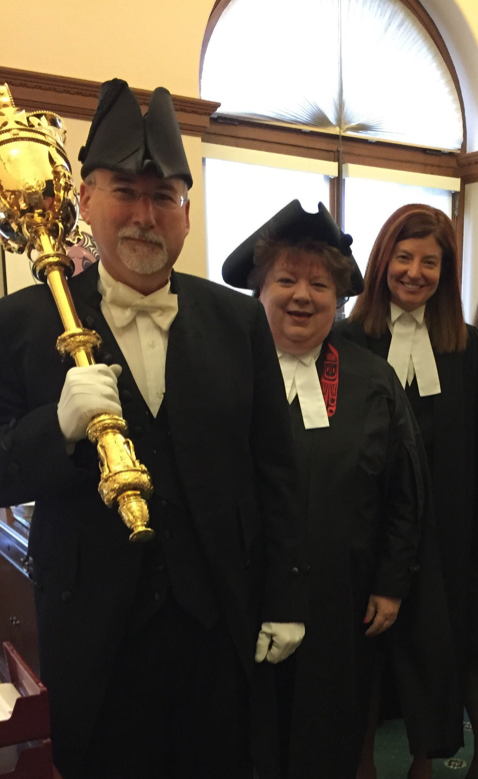
Retired-in-disgrace Sergeant-at-Arms Gary Lenz (BC Leg)
“There is no reason for the ceremonial, security, and facilities responsibilities at the Legislative Assembly to be assigned to the same person,” Mullen wrote. “British Columbia should follow the lead of Quebec and some of the American jurisdictions surveyed, and divide the roles to allow better specialization and expertise within each.”
Mullen’s report was reviewed by the government’s chief security officer Paul Stanley and Doug LePard, the former deputy chief of the Vancouver Police who wrote the damning Police Act investigation that sparked Lenz’s resignation last fall.
Except for recent protests, the Legislature grounds have seen few major crime incidents. The Canada Day 2013 pressure cooker bomb plot was actually an RCMP sting operation in which the two suspects, John Nuttall and Amanda Korody, were entrapped and their addictions and mental health exploited by police. Their convictions were overturned and B.C. Court of Appeal called it a “travesty of justice.”
Victoria Police officers famously hauled away bankers boxes of documents from the Parliament Buildings in late December 2003 as part of a police raid in the early days of the investigation of the BC Rail bribery scandal.
Support theBreaker.news for as low as $2 a month on Patreon. Find out how. Click here.








